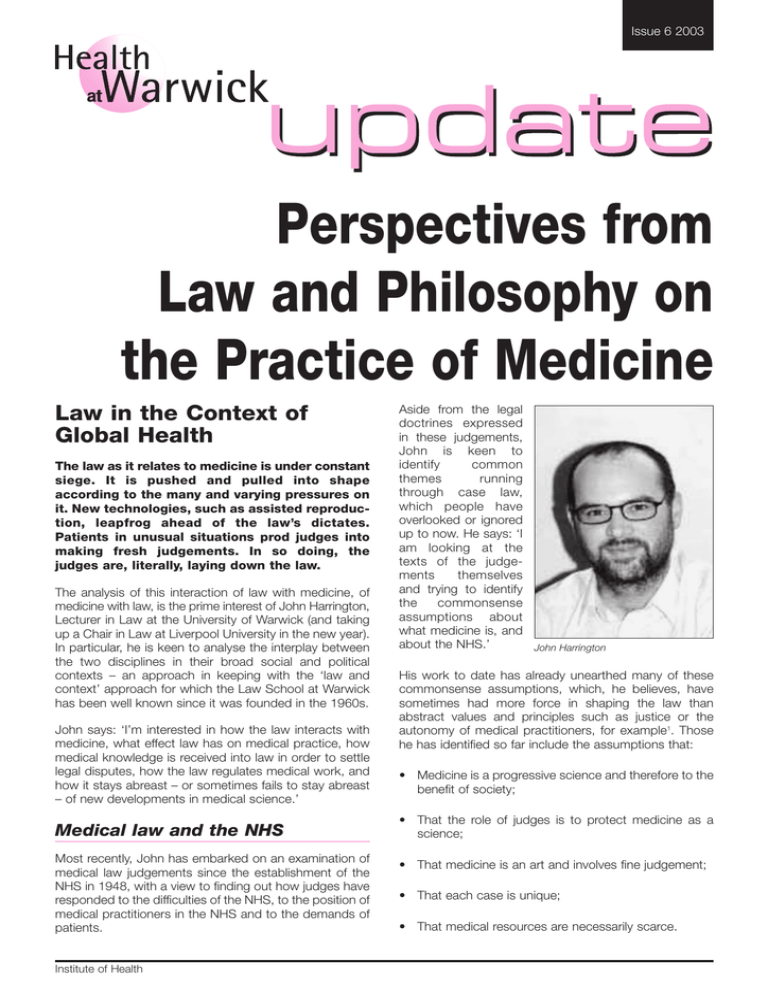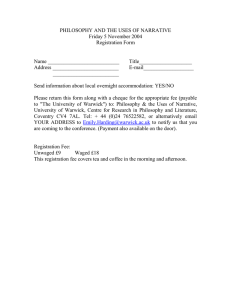Perspectives from Law and Philosophy on the Practice of Medicine
advertisement

Issue Page 6 2003 3 Perspectives from Law and Philosophy on the Practice of Medicine Law in the Context of Global Health The law as it relates to medicine is under constant siege. It is pushed and pulled into shape according to the many and varying pressures on it. New technologies, such as assisted reproduction, leapfrog ahead of the law’s dictates. Patients in unusual situations prod judges into making fresh judgements. In so doing, the judges are, literally, laying down the law. The analysis of this interaction of law with medicine, of medicine with law, is the prime interest of John Harrington, Lecturer in Law at the University of Warwick (and taking up a Chair in Law at Liverpool University in the new year). In particular, he is keen to analyse the interplay between the two disciplines in their broad social and political contexts – an approach in keeping with the ‘law and context’ approach for which the Law School at Warwick has been well known since it was founded in the 1960s. John says: ‘I’m interested in how the law interacts with medicine, what effect law has on medical practice, how medical knowledge is received into law in order to settle legal disputes, how the law regulates medical work, and how it stays abreast – or sometimes fails to stay abreast – of new developments in medical science.’ Medical law and the NHS Most recently, John has embarked on an examination of medical law judgements since the establishment of the NHS in 1948, with a view to finding out how judges have responded to the difficulties of the NHS, to the position of medical practitioners in the NHS and to the demands of patients. Institute of Health Aside from the legal doctrines expressed in these judgements, John is keen to identify common themes running through case law, which people have overlooked or ignored up to now. He says: ‘I am looking at the texts of the judgements themselves and trying to identify the commonsense assumptions about what medicine is, and about the NHS.’ John Harrington His work to date has already unearthed many of these commonsense assumptions, which, he believes, have sometimes had more force in shaping the law than abstract values and principles such as justice or the autonomy of medical practitioners, for example1. Those he has identified so far include the assumptions that: • Medicine is a progressive science and therefore to the benefit of society; • That the role of judges is to protect medicine as a science; • That medicine is an art and involves fine judgement; • That each case is unique; • That medical resources are necessarily scarce. Page 2 John’s goal will then be to put these assumptions in the context of the health system in Britain since the Second World War. For example, he says, when the NHS was founded, the Government had to bargain with the medical profession, accepting their idea of professional autonomy in return for their cooperation. ‘As a consequence,’ John says, ‘the idea of medicine as an art was preserved, and that is reflected in the commonsense assumptions of the judges.’ Regulating medical practice in Tanzania His work on the legal system in Tanzania has similarly concentrated on the factors influencing the way the law has developed there, and on the problems that have arisen because of changes in economic and social policies. Both the law and the system of medical care in Tanzania were inherited from the colonial period. Up until the 1990s, the health service in Tanzania was nationalised, similar to the UK’s NHS. Then economic necessity forced the country to introduce a market in medicine, with ‘consumers’ charged for services. John notes that the Tanzanian Medical Council faced numerous problems after this, in trying to regulate such practices as consultants referring patients out of hospitals to their own private clinics, to boost their own incomes. Doctors and clinics were also allowed to advertise – a practice traditionally banned by the British model of medical professionalism. At independence in 1961, there were only 14 Tanzanian doctors. Although there were 1,265 in 1992, there was still only one doctor for every 21,400 Tanzanians by 1998, compared to one for every 1,890 people in the UK. 40 per cent of health care facilities in the country are now in the private sector, with one in four of these operating for profit. Having decided to study the level and type of litigation relating to medical practice in Tanzania, John found only three formally reported cases featuring medical negligence in the case files of the High Court in Dar es Salaam. His review of these cases, to be published this autumn in Medical Law International 2, concludes that one of the main reasons for this low level of litigation has been that a large proportion of the population has virtually no access to health care. Those people who are never treated in a hospital, where more risky procedures are carried out, will never be in the position of being injured in a medical accident. Even if someone is, the difficulty of suing the only doctor in the area, who will of necessity be the doctor caring for him or her and his or her relatives in the future, is likely to make the person think twice about it. A further problem, John points out, is that there is only one lawyer for every 138,000 Tanzanians, compared with one for every 900 people in England and Wales. Of the 152 lawyers in Tanzania, most are based in one of three towns, leaving only 14 in the rest of the country. Institute of Health Global health law The paper in Medical Law International analyses how the changes in society and politics in Tanzania of the past decade or so are likely to alter the relationships that people have with their doctors, and their potential impact on the health care system as a whole. John says: ‘My argument is that Western-style civil liability may have perverse or negative effects on the quality and distribution of health care in a very poor country, where access to health resources is very much restricted, so that a rule of liability or negligence developed in England or the US may have a much more deleterious effect in the context of Tanzania.’ John’s interest in law as it relates to medicine in a developing country such as Tanzania has developed into a wider quest to determine the scope for a global health law. He is currently editing a special issue of the online journal Law, Social Justice and Global Development, on Global Health Law which is scheduled to appear in January 2004. He says: ‘I am interested in seeing to what extent a global health law is emerging from the practices and rules of bodies like the World Bank, which initiated structural adjustment, but also the World Trade Organization, the World Health Organization and civil society bodies like Oxfam or the Commonwealth Medical Association.’ While he does not envisage one overarching hierarchically organised system of health law, it is clear to him that law is created in different places by different bodies that set norms. ‘Although we don’t have a global government,’ John says, ‘we have an emerging global society, with balances and imbalances of power at a global level, and the more powerful are better able to make norms. My contention is that those norms are made by bodies like the World Health Organization and the World Trade Organization, and contributed to by pharmaceutical companies, as well as by non-governmental organisations such as Oxfam, for example, which campaign against some of those companies’ policies.’ Without such laws, the exploitation of weaker and vulnerable people and countries could go ahead unchecked, John predicts. ‘But the fact that there is such a law will not be enough: we have to be able to criticise it, and to criticise the law-making process. We have to be able to ensure that groups such as women are able to contribute to this process in developing countries, and that developing countries themselves are also able to put their views.’ References 1. Harrington J.A. ‘Red in Tooth and Claw’. The Idea of Progress in Medicine and the Common Law. Social and Legal Studies 2002; 11: 211–232; Regulating Clinical Practice. Epistemological and Cognitive Perspectives Medicine and Law 2003; 22: 221–230. 2. Harrington J.A. The Poor, the Sick and the Market: Privatizing Health Care in Tanzania. Medical Law International 2003:10 forthcoming. Page 3 Values-Based Practice There can hardly be a health care professional in the country who has not heard of evidence-based practice. Before much longer, they will all be talking about values-based practice, too. Bill (KWM) Fulford Where evidence-based practice aims to ensure that people receive the best treatment according to the latest reliable scientific research, the goal of values-based practice is to help people make the right decision about health care while taking into account what is sometimes an astonishing complexity of different values. Bill (KWM) Fulford, Professor of Philosophy and Mental Health at the University of Warwick and Honorary Consultant Psychiatrist at the University of Oxford, who conceived the idea of values-based practice, defines it as ‘the theory and clinical skills-base of effective health-care decision-making where different – and hence potentially conflicting – values are in play’. There are many instances in health care, he says, where we face problems in making decisions because we need to take into account not only matters of evidence, but conflicting values. Health care choices and values Values-based practice has come to the fore in the area of mental health because, Bill says, ‘this is an area where diversity of values is particularly pronounced’. But he predicts that every other area of health care will eventually follow where psychiatry is leading. ‘The reason is that, in all areas of health care, science is basically opening up choices, and with choices go values,’ he adds. Bill, a medical doctor who initially trained in immunology and then became a psychiatrist, did a D. Phil. with Mary Warnock in Oxford. This work culminated in the publication of a book called Moral Theory and Medical Practice1. This, he says, sets out the theoretical ideas that he has subsequently used to underpin the concept of values-based practice. Health professionals may feel that they already have ways of dealing with conflicting values, with the help of ethics committees and bioethical guidelines, for example. Bill points out, however, that bioethics as a discipline has developed in an increasingly quasi-legal direction. ‘Witness the growing mountain of ethical codes and regulations,’ he says. Institute of Health While bioethics seeks to define the ‘right’ outcomes and then develop regulatory frameworks to impose these outcomes on health care decision-making, Bill says, values-based practice has a different starting point. He explains: ‘It begins with the recognition that while there may be ‘framework values’ – that is, values that we all genuinely share – the far more common situation in health care is that there will be different, and legitimately different, values bearing on a given situation. So values-based practice shifts the focus from ‘right outcomes’ to ‘good process’ – and in values-based practice, good process means the development of the clinical skills for working with complexity of values.’ Values and evidence in mental health These ideas have already received a high level of endorsement by policy makers in the field of mental health. The National Institute for Mental Health in England (NIMHE), which is responsible for implementing the Government’s policies on mental health as defined by the National Service Framework for Mental Health, has already adopted a National Framework for Values-Based Practice. This was developed following a consultation process and a national online conference and will now be rolled out through all NIMHE’s streams of work. The NIMHE framework, which is published at a website hosted by the Mental Health Foundation2, spells out three principles of values-based practice. First, it recognises the role of values alongside evidence in all areas of mental health policy and practice. Secondly, it is committed to raising awareness of the values involved in different contexts. Thirdly, it respects diversity of values. Bill is also trying to push out the boundaries of valuesbased practice into the arena of diagnosis – something that, according to the traditional model of medicine, has always been a ‘value-free zone’, he says. He explains: ‘The traditional picture has been – here is diagnosis, which is science; when we have decided what the problem is, ethics might come into the treatment choices.’ But philosophical analysis suggests, he says, that some of the key difficulties with diagnosis in psychiatry arise because the diagnoses in question are based on valuejudgments, rather than on judgments of fact. ‘Examples of where this could be important include assessments of decision-making capacity in anorexia nervosa, in psychotic disorders such as schizophrenia, and with unexplained discrepancies in rates of diagnosis, such as high rates of schizophrenia in African-Caribbean people,’ Bill says. Bill perceives that values-based practice adds a new dimension to the work of health care professionals. Many, Page 4 he notes, have felt under increasing pressure to meet targets and practice defensive medicine, and have ended up putting on one side the caring philosophy that had attracted them to working in health care in the first place. ‘Values-based practice responds to this by helping practitioners, patients and carers, and indeed managers and policy-makers, to recognise that each of their perspectives is valid and important,’ Bill says. ‘It is a positive response that allows us to get back to our roots, and build a strong alliance between users and providers of services, within both the opportunities and the challenges that are provided by a modern health care system.’ Building on the research: Developing skills for values-based practice Training materials and courses following the philosophy of values-based practice are already under development. Bill and colleagues at the University of Warwick (including the Institute of Health and School of Health and Social Studies), and at the Sainsbury Centre for Mental Health, with Robert Standfield at the West Midlands South Workforce Development Confederation, supported by NIMHE through Ian McPherson of the West Midlands Regional Development Centre, have produced a national pilot programme in mental health training and development, which began to accept students this autumn. The 12-month programme at the University of Warwick will lead to a Postgraduate Certificate in Contemporary Mental Health Practice. A handbook of training materials is also near completion. Bill says this will form the basis for new training initiatives being developed under the leadership of Kim Woodbridge at the Sainsbury Centre for Mental Health and in partnership with the University of Warwick3. The materials have already been piloted around the UK with mental health teams working in ‘challenging’ areas such as assertive outreach and acute inpatient care, with ‘encouraging’ results, Bill says. The recognition that where psychiatry leads, the rest of the medical specialties will follow, has led to plans for the development of training materials in values-based practice across the full range of medical specialities for the Warwick Medical School. In connection with this the postgraduate Philosophy and Ethics of Mental Health Programme, which is the first programme of its kind in the world, has moved from Philosophy into the Warwick Medical School. Here, Bill will be working with Jeremy Dale, Professor of Primary Care, and Steve Field, West Midlands Postgraduate Dean, and other colleagues on new training and research initiatives. There are also joint developments with Professor John Bennington in the Institute of Governance and Public Management on the role of values-based practice in management and leadership. Institute of Health Bill says: ‘Although we have moved to the medical school, we will still be based in the Philosophy Department. Our aim is to build a really strong ‘Philosophy into Practice’ ethos as a distinctive feature of the training that we can offer from Warwick, not just for medical students but also for continuing professional development, and life-long learning for people from all medical specialities.’ Those who have already taken part in the pilot training programmes have talked about the work on values giving them ‘oxygen’ and new energy, Bill says. ‘They say it has given them a new confidence to defend their own values while at the same time respecting the values of their clients and patients, as well as of other clinical professionals, their managers and so forth.’ References 1. Fulford, KWM. (1989, reprinted 1995 and 1999; second edition forthcoming) Moral Theory and Medical Practice. Cambridge: Cambridge University Press. 2. See http://www.mentalhealth.org.uk. 3. Fulford, K.W.M., Williamson, T. and Woodbridge, K. (2002) Values-Added Practice (a Values-Awareness Workshop), Mental Health Today, October, pps 25–27. Institute of Health School of Health & Social Studies, The University of Warwick, Coventry CV4 7AL, United Kingdom Director Professor Gillian Hundt +44 (0) 24 765 27381 Gillian.Hundt@warwick.ac.uk Senior Research Fellow Dr Maria Stuttaford +44 (0) 24 765 72592 Maria.Stuttaford@warwick.ac.uk Research Secretary Cecilia Olivet +44 (0) 24 765 23164 Cecilia.Olivet@warwick.ac.uk CPD Secretary Allison Cowling +44 (0) 24 765 74097 A.Cowling@warwick.ac.uk General Enquiries +44 (0) 24 765 74097/8 +44 (0) 24 765 74101 enquiries@healthatwarwick.warwick.ac.uk



